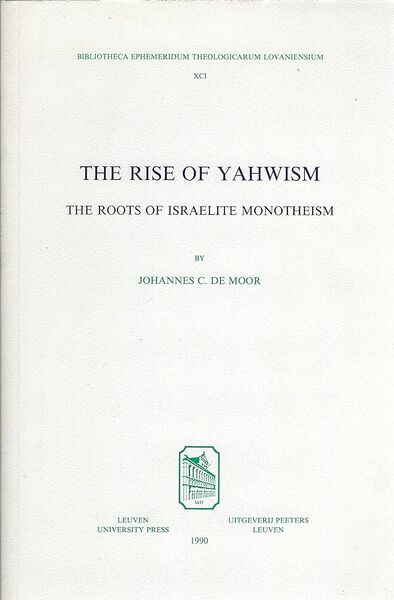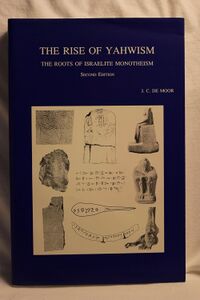File:1990 Moor.jpg

Original file (657 × 1,000 pixels, file size: 89 KB, MIME type: image/jpeg)
The Rise of Yahwism: The Roots of Israelite Monotheism (1990) is a book by Johannes C. de Moor.
Abstract
Drawing upon parallels from Egyptian, Mesopotamia, and other ancient Canaanite sources, Moor argues that the rise of Yahwism, which he defines as the exclusive worship of Yahweh, is "best understood against the background of the spiritual climate of the Late Bronze Age" (7). During this time period, both in Egypt (through the veneration of the one-god Amnu Re) and Babylon (through the worship of the one-god Marduk) monotheistic revolutions created a crisis in traditional polytheism, while in Canaan, Ugarit poetry demonstrates that the relentless struggle for power between two primarily gods, the older Ilu and his younger rival Ba'lu, created doubt in persons living there as to whether these two gods could subdue the forces of evil and offer persons from Canaan with the hope of a secure and blessed life. Set against this backdrop, Moor suggests that YHWH-El, like the parallel Ugarit deity Ilu, was originally "an ancestor of one of the proto-Israelite tribes who had 'joined' the head of the Canaanite pantheon after his death" (370). In other words, YHWH-El was originally conceived of as a deified ancestor, but quickly rose to the ranks to become the highest position in the pantheon. The Israelite patriarchs made covenants with this YHWH-El and elevated this deity to the rank of the One above all other deities. Accordingly, Moses (a literary figure based on a mighty man from Egypt known as Beya) was not the founder of Yahwism; Yahwism was older than Moses. Yet Moses did play a significant role in advancing the religion. Yet despite seeing these early intimations towards monotheism, Moor argues that neither Moses nor the judges Deborah or Gideon after him could be considered strict monotheists. This is became they did not deny the existence of other gods. All that can be said is to suggest that from early on Yahwism was a binding force among the tribes who had settled in Canaan, around Shechem, who were likely of Amorite origin, around the 13th century BCE. These tribes seem to have viewed YHWH and El as one God, which explains the lack of polemic against El in the Old Testament, and believed in this God as the One who was exalted above all others. Because the tribes of Israel saw themselves in a special covenantal relationship with this God, whereby he could be called upon to act justly, this helped to ameliorate some of the force of questions of theodicy, which naturally arose in the development of monotheism, and caused other religious groups to prefer a more polytheistic worldview. ~Deborah Forger
Editions and translations
Published in Leuven : University Press : Uitgeverij Peeters, 1990 / revised ed. 1997.
Contents
- 1 - Introduction
- 2 - The Evidence of Names
- 3 - The Crisis of Polytheism
- 4 - The Kingship of God
- 5 - Moses and the Exodus
- 6 - From Joshua to David
- 7 - YHWL-EL, God of the Fathers
- 8 - Epilogue
External links
- [ Google Books]
File history
Click on a date/time to view the file as it appeared at that time.
| Date/Time | Thumbnail | Dimensions | User | Comment | |
|---|---|---|---|---|---|
| current | 04:56, 16 April 2024 |  | 657 × 1,000 (89 KB) | Gabriele Boccaccini (talk | contribs) |
You cannot overwrite this file.
File usage
There are no pages that use this file.
